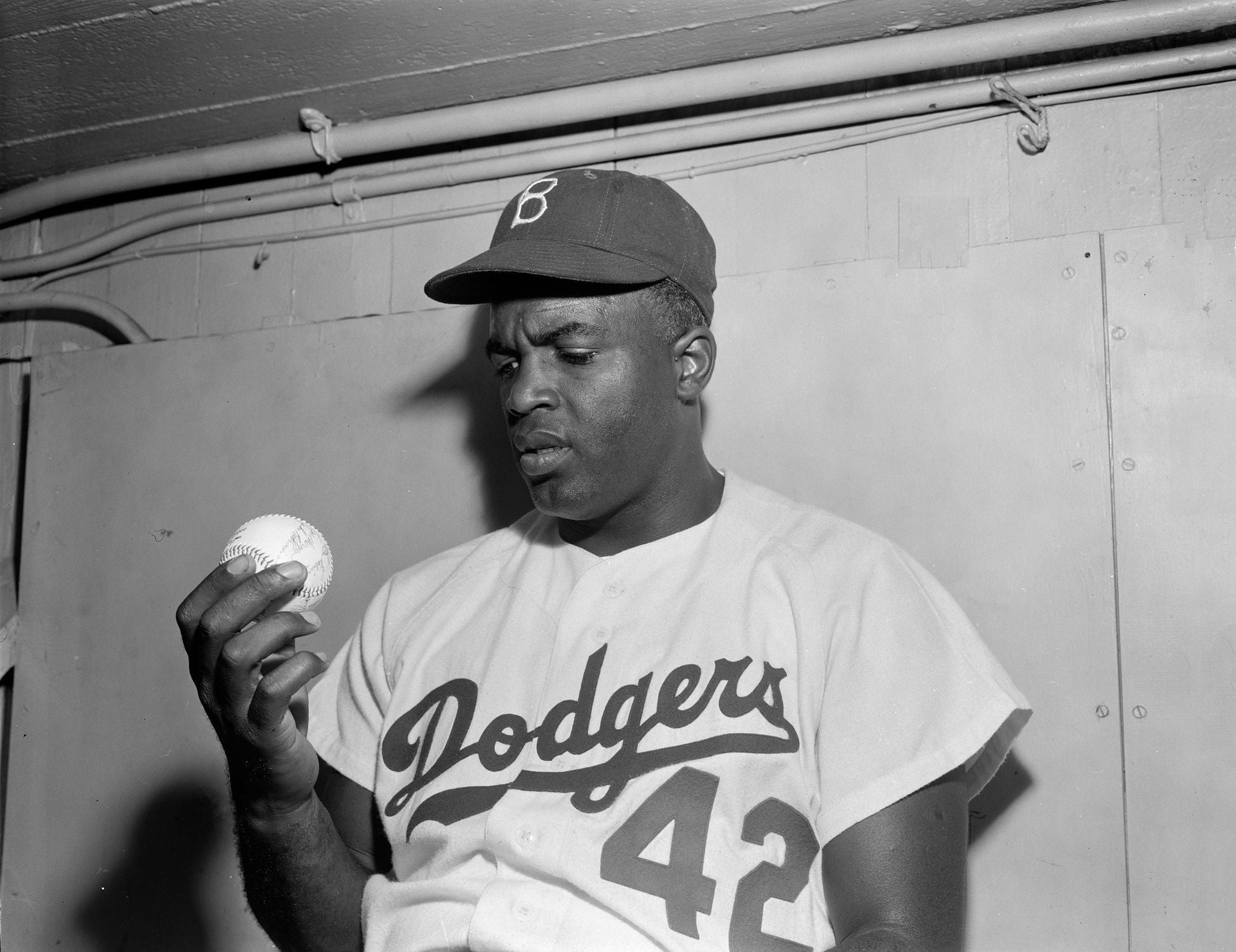April 15, 1947, 70 years ago: Jackie Robinson makes his major league debut, the 1st black player in Major League Baseball in 63 years, at Ebbets Field in Brooklyn, New York City.
He wore Number 42 -- apparently, it was the lowest number not yet claimed by an established player -- and played 1st base. (Starting the next season, he would play 2nd base. By 1953, he was being used at 3rd base.) He handled 13 chances, including 3 pop-ups, without an error, despite never having played the position before Spring Training the previous month.
Batting 2nd in the order against Johnny Sain, a very good pitcher, he grounded to 3rd in the 1st inning, flew out to left in the 3rd, and grounded to short to start a double play in the 5th. But in the 8th, he reached 2nd base on an error when his attempt to bunt Eddie Stanky over was mishandled, and they both scored on Pete Reiser's double. These would be the winning runs in the Dodgers' 5-3 victory over the Boston Braves.
September 30, 1947: Game 1 of the World Series. The Dodgers had won the Pennant, and were preparing to play the Yankees. All together, Jackie Robinson and his 24 white teammates stand on the 3rd-base line at Yankee Stadium, hearing the National Anthem.
Jackie would write in his memoir, which he titled I Never Had It Made, that this was the highlight of his career: Not only had he played in the white major leagues, but he had been accepted by his teammates, and, together, they had succeeded. They were the National League Champions.
October 4, 1955: After losing the World Series to the Yankees in 1947, 1949, 1952 and 1953, losing a Pennant on the last day of the season to the Philadelphia Phillies in 1950, and losing a Playoff for the Pennant to their arch-rivals, the New York Giants, in 1951 -- after already blowing Pennants to the St. Louis Cardinals in 1942 and 1946, before Jackie got there -- the Dodgers beat the Yankees 2-0 in Game 7 at Yankee Stadium, and finally win the World Series.
Dodger manager Walter Alston was no fan of Robinson, seeing him as a challenge to his authority. He did not put Jackie in the game. But Jackie, in spite of his rising weight and increasing injuries reducing his vaunted speed, was the 1st man out of the dugout to celebrate on the field with his teammates who did get into the game. He retired after the next season, winning 1 more Pennant, but, again, losing the Series to the Yankees.
July 23, 1962: Jackie Robinson is the 1st nonwhite player inducted into the Baseball Hall of Fame. He was elected in his 1st year of eligibility.
July 16, 1964: Senator Barry Goldwater of Arizona accepts the Republican Party's nomination for President at their Convention in San Francisco.
Jackie was a Republican because of Abraham Lincoln, due not just to his having freed the slaves, but to his message of self-reliance. Jackie worked for one of the other candidates for the 1964 Republican Presidential nomination, Governor Nelson Rockefeller of New York, whom he had seen, and whom he had helped, work toward civil rights advances.
Goldwater had voted against the Civil Rights Act of 1964 -- he said, because he believed 2 of its 11 clauses were unconstitutional. Being one-quarter Jewish, he believed bigotry of any kind was wrong. But a lot of his supporters were racist, and many Southern Democrats switched parties to vote for him. Not enough to swing the election: Indeed, many liberal and moderate Republicans crossed the aisle, one time, to vote to give a full term to President Lyndon Johnson, who had signed the act that his late predecessor, John F. Kennedy proposed.
Jackie told writer Roger Kahn, who had covered the Dodgers for the New York Herald Tribune, and would later write The Boys of Summer about them, "It would make everything I've worked for meaningless if baseball were integrated, but America's political parties were segregated."
He had supported Richard Nixon over Kennedy in 1960, but supported Johnson over Goldwater in 1964, would support longtime civil rights activist Hubert Humphrey over Nixon in 1968, and was supporting George McGovern over Nixon in 1972.
June 4, 1972: The Dodgers, having moved to Los Angeles in 1958, retire their 1st uniform numbers: The 42 of Jackie Robinson; the 39 of his Brooklyn teammate, MLB's 1st black catcher, Roy Campanella; and the 32 of pitcher Sandy Koufax, who was briefly a Brooklyn teammate of theirs, but became a star in L.A. Sandy had just joined Jackie and Campy in the Hall of Fame.
October 15, 1972: Jackie Robinson throws out the ceremonial 1st ball before Game 2 of the World Series at Riverfront Stadium in Cincinnati. He is introduced in a pregame ceremony, honoring the 25th Anniversary of his debut, by Red Barber, who had broadcast in both Cincinnati and Brooklyn.
Jackie looks far older than his 53 years. He was plagued by diabetes, which had robbed him of most of his sight, ruined his circulation, caused his doctors to consider amputating his legendary legs, and given him a bad heart.
In his speech, Jackie says, "I'm extremely proud and pleased to be here this afternoon, but must admit, I'm going to be tremendously more pleased and more proud when I look at that third base coaching line one day, and see a black face managing in baseball."
October 24, 1972: Jackie Robinson dies of a heart attack at his home in Stamford, Connecticut.
October 3, 1974: Frank Robinson is named the manager of the Cleveland Indians. He is the 1st black manager in Major League Baseball. He says he wished Jackie (no relation) had lived to see the moment.
April 15, 1997: I won tickets to a 50th Anniversary tribute to Jackie at Shea Stadium in a radio contest. I took my grandmother, a Dodger fan whose greatest all-time hero was Jackie. His surviving family and several teammates attended. So did President Bill Clinton, who gave a speech. So did Baseball Commissioner Bud Selig, who announced an unprecedented honor: Uniform Number 42 would be retired throughout baseball.
Players who were currently wearing it could continue to do so for the remainder of their careers. This included Butch Huskey, playing 3rd base for the Mets that day (but more often than not, a right fielder); Mo Vaughn, the All-Star 1st baseman for the Boston Red Sox; and Mariano Rivera, the great relief pitcher for the Yankees, who retired in 2013, and was thus the last player to wear the number regularly.
Oh yes, there was a game. Appropriately, the ceremony was in New York, the city where Jackie debuted. Equally appropriately, the opponent was the Los Angeles Dodgers. Jackie was born in Cairo, Georgia on January 31, 1919, but had grown up outside L.A., in Pasadena, and attended Pasadena City College and UCLA. Anyway, the Mets won, 5-0.
April 15, 2007: Still the Commissioner, Selig announces that April 15 would annually be celebrated as Jackie Robinson Day in baseball. He also allowed teams that would be playing on the road on April 15 to hold Jackie Robinson Day on their next-closest home date.
He announced that every player on every team -- regardless of race -- would wear Number 42 on that day. This is so that they could acknowledge what Jackie had done, to ensure either that they could play, or that they could play with anyone.
It's also a baseball version of "I'm Spartacus!" To show our empathy for all he went through. Although, in the Twitter era, the hashtag #IAm42 hasn't really caught on.
April 16, 2009: Citi Field opens as the new home of the Mets. Its home plate entrance is meant to mimic that of Ebbets Field, and it includes the Jackie Robinson Rotunda, sort of a baseball version of the museum at a Presidential Library. This is in spite of the fact that Jackie had nothing to do with the Mets. I don't know if he ever even visited Shea Stadium.
November 22, 2014: UCLA announces that it will retire Number 42 for Jackie across all of its sports teams -- although he wore 28 in football and 18 in basketball. I can find no reference to what number he wore on the UCLA baseball team. Ironically, baseball was only his 4th-best sport there: He was also a track star.
April 15, 2017: There are lots of black players in Major League Baseball, but most of them are Hispanic. Black Americans have, especially from the 1960s onward, turned more to football and basketball than baseball.
Only 2 current MLB managers are African-American: Dave Roberts of the Dodgers and Dusty Baker of the Washington Nationals. Another, Rick Renteria of the Chicago White Sox, is a white Hispanic. The San Diego Padres have a manager named Black, former major league pitcher Harry "Bud" Black, but he's white.
Ironically, the team with the most African-Americans (in addition to their black Hispanics) now is the team that, in 1959, became the last formerly all-white team to integrate: The Boston Red Sox.
And after 8 years of the 1st black President, Barack Obama, the White House is now occupied (when he's not skipping town and going to his compound in 96 percent white Palm Beach, Florida, that is) by a person who surrounds himself with "white nationalists."
Hillary Clinton won the black vote 88 percent to 8, the Hispanic vote (white and black combined) 65-29, and the Asian vote 65-29 -- but Donald Trump won the white vote 58-37.
"It would make everything I've worked for meaningless if baseball were integrated, but America's political parties were segregated."
January 31, 2019: Barring a medical calamity, or an ethical calamity that gets acted on and produces a miracle of justice, Donald Trump will be the President of the United States on what would have been Jackie Robinson's 100th Birthday.
Inscribed on Jackie's tombstone at Cypress Hills Cemetery in Brooklyn is a quote of his: "A life is not important, except in the impact it has on other lives."
Some people don't realize the impact they have on other lives. Some do, and they can't see that it's harmful. Some can, but they don't care, as long as they get what they want.
Jackie Robinson knew that his place in baseball would have an impact on lives that would come long after his own, including lives that wouldn't even be interested in baseball.
That impact is still felt, 70 years after he ran onto the grass at Ebbets Field. To borrow a quote from one of my favorite movies, "He was you. And me. He was all of us."
We are all Number 42. We are all teammates of each other. And we should act like it.
Subscribe to:
Post Comments (Atom)





No comments:
Post a Comment